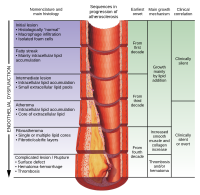
Photo from wikipedia
Epigenetics refers to functionally relevant genomic changes that do not involve changes in the basic nucleotide sequence. Majorly, these are of two types: DNA methylation and histone modifications. Small RNA… Click to show full abstract
Epigenetics refers to functionally relevant genomic changes that do not involve changes in the basic nucleotide sequence. Majorly, these are of two types: DNA methylation and histone modifications. Small RNA molecules called miRNAs are often thought to mediate post‐transcriptional epigenetic changes by mRNA degradation or translational attenuation. While DNA methylation and histone modifications have their own independent effects on various cellular events, several reports are suggestive of an obvious interplay between these phenomena and the miRNA regulatory program within the cell. Several miRNAs like miR‐375, members of miR‐29 family, miR‐34, miR‐200, and others are regulated by DNA methylation and histone modifications in various types of cancers and metabolic diseases. On the other hand, miRNAs like miR‐449a, miR‐148, miR‐101, miR‐214, and miR‐128 target members of the epigenetic machinery and their dysregulation leads to diverse cellular aberrations. In spite of being independent cellular events, emergence of such reports that suggest a connection between DNA methylation, histone modification, and miRNA function in several diseases indicate that this connecting axis offers a valuable target with great therapeutic potential that might be exploited for disease management. We review the current status of crosstalk between the major epigenetic modifications and the miRNA machinery and discuss this in the context of health and disease.
Journal Title: Journal of Cellular Physiology
Year Published: 2017
Link to full text (if available)
Share on Social Media: Sign Up to like & get
recommendations!